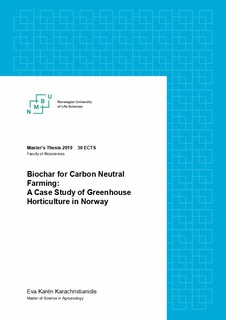Biochar for carbon neutral farming : a case study of greenhouse horticulture in Norway
Master thesis
Submitted version

View/
Date
2019Metadata
Show full item recordCollections
- Master's theses (IPV) [240]
Abstract
Norway is on the list over nations who directly contribute to a significant part of the European and global greenhouse gas-emissions and is a direct contributor to global warming and its related problems. As a result of this the nation is aiming to transition away from being a fossil fuel-based economy and is working towards becoming a low-emissions society by 2050.
Biochar is one of the measures predicted to have the highest potential of reducing the carbon-emissions from the Norwegian agricultural sector, and there are indications that it can play an important role in dealing with the threats of climate change and achieving agroecosystem sustainability.
The technical, organisational and economical side of biochar implementation is already being researched, but it is important to investigate relevant social, cultural, and political factors for implementing biochar in Norway as well. Farmers may play a key role in this. As the horticultural greenhouse industry has received criticism for being heavily dependent on fossil inputs such as natural gas, peat and CO2-gas, this might be a niche for pioneering a wider adoption of renewable biochar pyrolysis technology.
A case that is currently under particular pressure when it comes to sustainability and transition is the horticultural industry of Finnøy and Rennesøy municipalities in the west of Norway. One of the national goals is namely to phase out all use of fossil energy in the greenhouse industry, and Rogaland County (where Finnøy and Rennesøy are located) aims to make their greenhouse production carbon neutral.
This has been the focus of my thesis research, and through in-depth interviews with three horticultural greenhouse farmers I have investigated some prerequisites, limitations and enabling factors for such an implementation. I have also looked at the attitude towards biochar in the region through talking with relevant stakeholders. Norge befinner seg på listen over nasjoner som direkte bidrar til en betydelig del av de europeiske utslippene av drivhusgasser, og er derfor en direkte bidragsyter til global oppvarming og problemene det medfølger. Som et resultat av dette er det et nasjonalt fokus på å gå vekk fra en fossil-basert økonomi, og jobber mot å bli et lavutslippssamfunn innen 2050.
Biokull er en av metodene som spås å ha det høyeste potensialet for å redusere karbonutslippene fra norsk landbrukssektor, og det finnes indikasjoner på at biokull kan spille en viktig rolle i å håndtere truslene fra klimaendringer og det å oppnå agroøkosystemisk bærekraft.
De tekniske, organisatoriske og økonomiske sidene av biokullimplementering forskes det allerede på, men det er også viktig å undersøke relevante sosiale, kulturelle og politiske faktorer for å implementere biokull i Norge. Bønder kan spille en viktig rolle her. Ettersom veksthusindustrien har fått kritikk for å være svært avhengig av fossile innsatsmidler så som naturgass, torv og CO2-gass, kan dette være en nisje som kan rydde veien for en bredere implementering av fornybar biokull-pyrolyse-teknologi.
En case som for tiden er under stort press når det kommer til bærekraft og overgang, er veksthusindustrien in Finnøy og Rennesøy kommuner på vestkysten av Norge. Ett av de nasjonale målene er nemlig å fase ut all bruk av fossil energi i veksthusindustrien, og Rogaland Fylke (hvor Finnøy og Rennesøy befinner seg) søker å gjøre veksthusindustrien karbonnøytral.
Dette har vært fokuset for denne masteroppgaven. Gjennom dybdeintervjuer med tre veksthusbønder har jeg undersøkt noen forutsetninger, begrensinger og tilretteleggende faktorer for en slik implementering. Jeg har også sett på holdninger til biokull i regionen gjennom samtaler med relevante interessenter.
